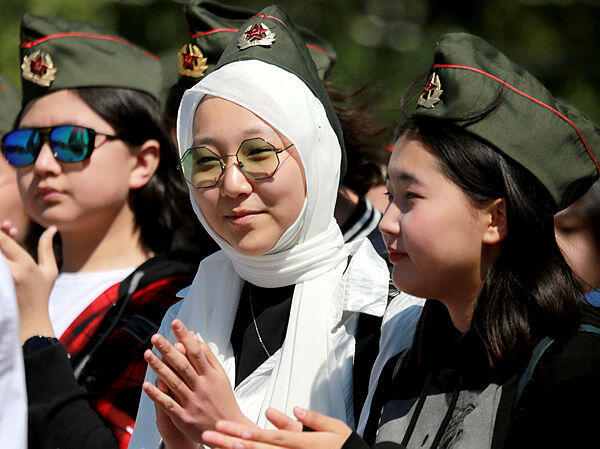It's just another day in your typical Kyrgyz village. Rustic and traditional stone-constructed central Asian homes are interspersed throughout. Every day villagers carry food and amenities to their families, walking on the dirt roads that crisscross the village, the metallic handles of their buckets are clanking with every step.
Read more:
The sound of a few cars driving. The distant barking of village dogs. Some birds chirp from their perches. Kids running around and playing.
People are going about their daily business when a car pulls up. About four or five adult males and one female, all in their 20s, emerge. The young woman approaches another young woman named Aruzat, who is wearing a green and black outfit, her black hair tied in a bun, pumping water from the village well for her family.
Aliya, the girl who came with the men, approaches Aruzat. She's her good friend. They know each other well. Aliya is speaking to Aruzat, distracting her from the threat emanating from behind.
Suddenly, without any warning, the men approach and grab the oblivious Aruzat, immediately dragging her off into the car, kicking and screaming. Her feet are off the ground. Aliya, the "good friend", is helping the men put Aruzat in the car.
The other villagers do not view this as an unusual event, nor do they cry, scream, call for help or alert the authorities. Instead, they smile, as if to say: "Well, I guess that was bound to happen".
Meanwhile, in the car, Aruzat continues to struggle as much as she possibly can, but three men are holding on to her, not letting her go anywhere. They're not hitting her. They're not molesting her in any way. They're not trying to undress her. They're simply holding onto her, not letting her move.
She continues to wiggle and scream and struggle as much as she can, but she's a 20-something-year-old girl. There is no way for her to overpower three adult men.
The car enters a different village. Car doors open, and the obviously bewildered Aruzat is dragged outside. She's out of breath and her tears from before are beginning to dry. She's exhausted. Her stamina can hold no longer.
She's dragged inside a traditional tent called a "Yurt" and gently placed on the ground. Immediately, several village elders, all women, are coming inside the yurt and begin treating her like she's their daughter. Perhaps the colorfully-woven fabric inside the yurt is meant to quell the girl's fears and make her panic subside, as if to say 'It's not that bad'.
They give her scarves. They calm her down. They hand her a glass of water. One of the village elders says "Let's pray to God now".
Then comes candy. So much candy. It's thrown all over the yurt, as if to commemorate what they perceive to be a "sweet" moment. The village elders kiss the young woman, who, in the meantime, is beginning to calm down.
"This is just the way it is here," a village man in his late 60s, says. "This is our tradition. We kidnap the girl. We bring her over. We treat her like she's one of ours. We bathe her, we clothe her. And now she's going to be the bride to one of our young men. This is who we are"
They give her candy, and then she joins them in prayer. It is hard to determine whether she's doing it because she's afraid of what would happen to her if she didn't, or if she has come to terms with her position.
Aruzat is sitting down at the table and dining with the village elders. She is smiling now. As if she understands it's just the way it is and complaining will serve no purpose.
In a matter of 20-30 minutes, this girl's life has radically changed. She was just minding her own business in her village, going about her chores, and half an hour later, she's forced to live in a different village with people she doesn't know and is to be wed to a man she can barely tell from a crowd. This is her life now, and there's nothing she can do about it.
When you ask the other villagers about the seemingly disturbing event they've just witnessed, their response can be summed up in one word - Complacency.
"This is just the way it is here," a village man in his late 60s, says. "This is our tradition. We kidnap the girl. We bring her over. We treat her like she's one of ours. We bathe her, we clothe her. And now she's going to be the bride to one of our young men. This is who we are."
Bridal abduction, or "Ala Kachuu" in Kyrgyz, is a sadly longstanding practice in Kyrgyzstan and other parts of Central Asia. It involves either one or multiple men, either during daylight or after sunset, grabbing women off the street and sometimes from the privacy of their own homes, and dragging them off to a different location with the purpose of an arranged marriage.
The practice's goals are two-fold: To prove a man's love and commitment to a woman, and more nefariously - to bypass the traditional process of seeking consent from the woman's family.
Despite numerous efforts to curb this practice's ubiquitous nature, success remains elusive. More than one-in-three women are wed via Ala Kachuu in the Central Asian republic, according to a UN report. Many of these women are forced to endure physical and emotional abuse, with encounters often turning fatal.
Other women, so deeply traumatized by the ordeal, devoid of hope and cut off from any support, including their own parents who encourage their daughters to come to terms with their new lives, commit suicide.
It comes as no surprise that in that part of the world, a strict patriarchal code conducts most elements of everyday life. Thus, women are expected to be subservient to men and to prioritize their families' wishes over their own. The tradition of Ala Kachuu perpetuates these harmful attitudes and can have lasting effects on a woman's psyche.
Not everyone in Kyrgyz society is happy with this. In 2013, the Kyrgyz government criminalized Ala Kachuu, making it punishable by up to 10 years in prison. Enforcement, however, is lax, with many police officers either completely unaware of the event's illegality, tacitly supporting it, or just can't be bothered to enforce something they consider inconsequential.
With governmental oversight so ineffectual, activists and organizations have taken matters into their own hands to both provide support to victims and hold assailants accountable.
The Sezim Crisis Center, for example, provides counseling and legal assistance to women who have experienced domestic violence, including those who were abducted for marriage.
This practice is nothing new and has been around since the 18th century. Back then, kidnapping of a girl was the only way for a loving couple to get married if they could not do it, if the parents of either the man or the woman were opposed to the idea, or if financial issues stood in their way.
For example, a man who comes from a lower-class family would set his sights on a daughter of a bai (Meaning "wealthy person" in Kyrgyz). In these circumstances, Ala Kachuu was seen as a way to "power" through the problem and present the union as a fait accompli.
Regardless, there's no escaping the fact at at its most basic of terms, bridal abduction is an abhorrent violation of women's rights, as it both harms the woman physically and even more so, emotionally, and perpetuates harmful patriarchal attitudes.
It is incumbent upon the Kyrgyz people to take decisive action to put an end to this harmful tradition and ensure that all women are able to make their own choices about their marriages and what their future might bring, all on their terms.




